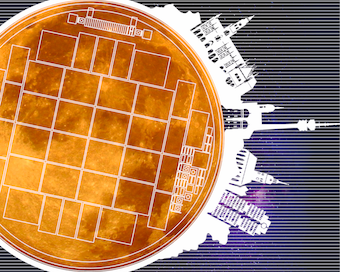Speaker
Description
The APiX sensor is a position-sensitive detector operating in Geiger-mode regime.
This novel device, formed by two vertically-aligned pixel arrays, exploits the coincidence between two simultaneous avalanche events to discriminate between particle-triggered detections and dark counts.
This concept allows to reduce the material budget and the power consumption in the presence of a high granularity and fast timing response.
A proof-of-concept two-layer sensor with per-pixel coincidence circuits was designed and fabricated in a 150 nm CMOS process and vertically integrated through bump bonding.
The sensor includes a 48 × 16 pixel array with 50 μm × 75 μm pixels, with different active areas from 43 × 45 to 30 x 30 μm2.
The first prototype has been characterized and then tested with a high energy particle beam at
CERN SPS, featuring a reduction of the dark-count rate (DCR) at room temperature by more than 4 orders of magnitude and a detection efficiency limited only by the geometric factor.
Extensive testing to evaluate radiation hardening are ongoing.
A second prototype, addressing the goal to improve the present fill-factor, has been designed and it is being manufactured.
A new and more refined beam test campaign has been planned at CERN SPS/PS before the end of the year, in order to better characterize the current demonstrator and test the new prototype.
Potential applications of this sensor include high spatial resolution tracking in high-energy experiments, radiation monitoring in space and imaging in nuclear medicine.
A small hand-held demonstrator is under construction for radio-guided surgery.
